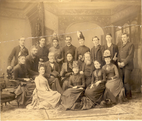In northern China, there is a big family that has followed Christ for nearly a century and has given birth to preachers for four consecutive generations. They have persevered through recurrent poverty, wars, and social upheavals. For nearly a century, they have constantly committed themselves to gatherings and ministry.
The Christian family's story of faith began over a century ago, from the conversion of a young man who deeply indulged in gambling. From his severe gambling addiction to his salvation by the gospel, from illiteracy to proficiency in teaching the Bible, his complete and entire change so moved the most educated elder gentleman in his village that even he came to Christ. His son, the father of Pastor Tianming, was born on a Christmas Day and had quietly held to his faith through the turmoil of the Cultural Revolution. Despite ridicule and insults, he continued to lead night gatherings in secret until he peacefully passed away at the end of one such meeting. Pastor Tianming is the third generation. After China's reform and opening up, he decided to demolish and rebuild his ancestral home and donated it as a permanent building to his church. He commits himself to theological education and pastoral ministry, becoming a key leader in the local church.
Below is the true story of how three generations of one family live out the biblical teaching based on Joshua 24:15: "But as for me and my household, we will serve the Lord." All their names are not fully disclosed due to security considerations.
Pastor Tianming's Grandfather: From Hopeless Gambler to Preacher
In the early 20th century, life in rural northern China was hard. With nearly blocked exchanges with the outer world and deeply entrenched traditional patriarchal systems, many villages relied entirely on farming. Very few men could leave their hometown for work, and women were of extremely low status. The population had very little access to education. Gambling, alcoholism, and superstition were widely practiced, forming the northern social norms.
Born in a small northern village during the turbulent years between the late Qing dynasty and the early Republic of China, the grandfather grew up in such an environment. Compared to many impoverished families, his family was relatively well-off. They owned land and houses and were considered moderate landowners at the time. However, in his youth, he was addicted to gambling and eventually lost all his inherited properties.
Desperate and destitute, he reached the end of himself. Around 1920, the gospel was eventually preached to his village by Western missionaries. The first batch of missionaries was from the Baptist Missionary Society (Britain) and the American Presbyterian missions. They established churches, schools, and hospitals locally. Soon after, around 1920, the grandfather accepted the Lord and completely quit his gambling addiction.
However, having grown up poor and never attended school, he was completely illiterate. Thus, he could not read the Bible, let alone understand its profound doctrines. Yet, according to his own and many others' testimonies, after his conversion, under the guidance of the Holy Spirit, he gradually learned to read the Bible. In time, he was even able to preach.
In their village lived an elder scholar gentleman, who was born in a prominent family and well educated in the Chinese classics. He was respected by all as the most educated man in the village. Once, the scholar, who had known Tianming's grandfather for years, heard the man preaching, clear in speech, logical in thought, and precise in quoting the Scripture. He was astonished. To test him, the scholar asked him to elaborate on the Four Books and Five Classics (collectively known as the Confucius classics, translator's note). Miraculously, though it was his first time reading them, the grandfather spoke with deep insight. Confronted with this undeniable reality, the scholar was silenced. He was moved to believe and became one of the first Christians in the area.
In a Confucian-dominated rural society, it was deeply and utterly striking to see an illiterate young man surpass a learned scholar in understanding. As scholar Wang Mingming observed in a book From the Soil: The Foundations of Chinese Society: "The spread of Christianity in the countryside often does not occur through rational debate but through the testimony of transformed lives, breaking the original power and knowledge structures."
The grandfather became a preacher, one of the first seven in the county. Though he never received formal theological education nor was he ordinated, his preaching capability and transformed life won him deep love and respect among local believers.
Since his conversion, he began holding gatherings in his home. At first, there were small meetings, but gradually they grew into village-wide assemblies. Between 1923 and 1933, the gospel work in the region reached its peak with "almost every household had believers," according to Pastor Tianming. The congregation once numbered three to four hundred, being one of the most vibrant churches in the county.
In 1966, however, the Cultural Revolution broke out, leading to the nationwide ban of all religious activities. Yet, his church miraculously continued by meeting in secret at night.
Because he had never been formally ordained and had been labeled a "poor peasant" before the Cultural Revolution (due to losing his property from gambling), he escaped the harshest political persecutions of landlords. Still, as a Christian, he was inevitably humiliated in public parades. Near the end of his life, he was paraded through the county for almost three months. Pastor Tianming recalled: "After that ordeal, my grandfather was brought home, and not long after, the Lord took him. He was not yet seventy."
Pastor Tianming's Father: Faithfulness in Persecution, Silent Witnessing in Hardship
Born in the 1930s and passing away in the early 1980s, Pastor Tianming's father lived between two eras. His early years were marked by war and poverty, and his later years by political campaigns and suppressions of faith. He never had a single day of true peace, yet his faith remained unshaken. He quietly served the Lord until his final breath.
Raised in a Christian home, Tianming's father was honest, diligent, and respected by all. During the Cultural Revolution, all church gatherings had to be held secretly. In their home, they keep a Bible passed down from their grandfather. Once, when the Red Guards came to search their house, the father hid the Bible inside the kitchen stove. Thanks to this, it survived the search. Almost every other Christian family's Bibles were confiscated and burned.
He worked as an accountant for three production teams (a collective agricultural unit responsible for farming and production) in the village, a heavy workload with meager pay. Long-term poverty led to malnutrition and likely hypoglycemia. "If he didn't eat on time," said Pastor Tianming, "his face would turn yellow, and he might even faint."
The father had seven children, and the whole family depended solely on his labor. Later, he developed asthma and suddenly passed away one night in the early 1980s, not yet reaching the age of fifty.
Pastor Tianming: From Theological Student to Church Leader
After his father's death, Pastor Tianming had no one left to rely on, so he devoted himself even more earnestly to ministry. During this process, he matured spiritually and gradually discipled many local believers, raising them from ordinary church members into ministers of the gospel.
The Cultural Revolution ended in 1976, but it was not until the early 1980s that the church in his hometown was resumed.
Before that, gatherings were still held secretly at night in his home. The village had no electricity, then they used kerosene lamps. Each household received only a small ration of kerosene per month, but because the church met often and for long hours, their supply would quickly run out before the end of each month.
In one meeting at night, the kerosene in the lamp was nearly gone, and the church had none left. The congregation decided to pray together. When they finished praying, the lamp was still burning and became even brighter than before. It lasted for more than a week.
Yet once, during a baptism service for more than twenty people, no one had eaten, and there were only about 1.3 kilograms of noodles for all of them, which was clearly not enough. Yet the miracle, like "five loaves and two fish," occurred. They used three pots to cook noodles. Everyone had their fill, and still, about half a pot of noodles remained in each pot. No matter how they tried, they could not finish them.
However, grace did not spare them physical hardship. In the late 1980s, he was not yet a pastor, so Tianming felt the need for deeper theological training and decided to study in another province. His wife had to stay to care for their two children, the farm, and sometimes sell clothing and sketchbooks at the town's market to survive.
She admitted she often resented him in her heart. But one day, a sister visited her and said she had been to the seminary where her husband studied. She informed her that Tianming was not eating well. "That's when I realized how hard his life was," the pastor's wife recalled. "He never told anyone, not even me, because he didn't want others to worry."
Recalling his seminary years, Pastor Tianming said: "Life was truly difficult. I had 40 yuan a month for living expenses and 25 kilograms of grain rations. By the late 1980s and early 1990s, most families were already eating steamed buns made from fine wheat, but I could only afford coarse corn buns and sweet potatoes."
After graduating from seminary, he returned home to continue the ministry. The church grew so rapidly that the old building could no longer hold the congregation. Pastor Tianming decided to demolish his own house and rebuild it as a new church. To save costs, he and his wife bought used bricks. Their hands were rubbed raw and bleeding from the rough surfaces. A skilled carpenter, Pastor Tianming personally crafted the wooden doors and windows, often working late into the night. From foundation to completion, the new church was built in less than two months.
Today, both Pastor Tianming's son and daughter-in-law have studied theology. His son now works in a Christian organization.
By far, the family continues the record of living out the biblical verse, "But as for me and my household, we will serve the Lord."
Originally published by the Christian Times
- Edited by Karen Luo and translated by Charlie Li












